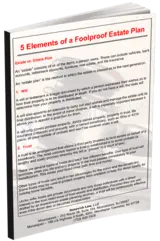
I am a loyal listener of The Michael Smerconish program on SiriusXM radio. Michael hosts his own show on Sirius XM and on CNN on Saturday mornings. He is also a Sunday columnist for the Philadelphia Inquirer. He is an attorney, an author of several books, and a “Philly guy”.
George HW Bush’s memorial service was on Dec 5th and – about 30 days prior to that day – Michael had lost his own father. The combination of the two events led Michael to come up with his 10 thoughts for how you deal with planning for your own passing and the passing of a loved one. Here are Michael’s rules, paraphrased by me, with some of my own commentary.
10 Thoughts on Dealing with Death and Dying
1. Have a will. You have the opportunity, through your will, to express your wishes even if you have nothing of value. You need think through what happens when its your time, if only to spare your family avoidable fights.
2. Have a medical directive / living will. You don’t want to wind up in a situation where your wishes, medically, are unknown, and someone is forced to make decisions on your behalf without know what you would have wanted in certain situations.
3. Have the conversation about burial arrangements. Do it one time, thoroughly, and file it away so you have it when the time comes. If you have something specific that you want or that don’t want, you must let someone know, so they can ensure that your wishes are fulfilled.
4. Think about your obituary. Set up a file, whether electronically or a hard copy. Someone will have to write it and present it – give them some guidance. Tell them some stories that you want to ensure are included.
5. If you’re a friend / acquaintance / coworker / etc of the deceased, attend. Go to the viewing. Go to the funeral. If you can get there, make the trip. The family members standing at the casket and shaking the hands will appreciate it you being there. Sign the book, so they can look back later and see that you were there.
6. Whether you attend or not, emails are fine, but letters are better. Take a page out of the book of George HW Bush, who was a letter writer. Today’s mail is junk and bills – a letter arrives that’s hand addressed – it gets people’s attention. The people you write about your experiences with the deceased and your memories of him / her will appreciate the touch.
7. Generally, and of course this is a personal choice, don’t get carried away with the arrangements. No matter how much you spend, it won’t bring them back. Simplicity works. Don’t get taken advantage of.
8. If they served in the military, say yes to the honor guard if you have the option. Its special and they earned it. Also, don’t limit the pall bearers. Allow everyone who wants to be involved a chance to do so.
9. Have pictures of them there. Blow them up. It’ll give you something to do leading up the funeral (gathering the pictures and having them printed / blown up), and it will reignite memories that you can use for the eulogy.
10. For the eulogy – anecdotes work. Tell the stories. Its OK to be funny, serious, and critical. Its OK to acknowledge faults.
The episode was terrific. I want to thank Michael for talking about the topic on the show and for sparking me to write and share this post with all of you. Its never pleasant to talk about these things, but what is even more unpleasant is failing to talk about them until its too late.

 (856) 439-6223
(856) 439-6223
